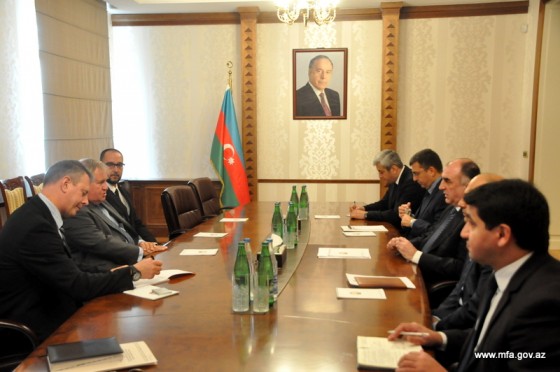
Baku, Azerbaijan, Sept. 15
Trend:
Armenia, settling Syrian refugees of Armenian origin in the occupied Azerbaijani territories and altering the demographic composition, grossly violates its obligations with regard to Geneva conventions and their additional protocols, said Azerbaijani Foreign Minister Elmar Mammadyarov.
He made the remarks Sept. 15 at a meeting with Robert Walter, rapporteur of the Political Affairs and Democracy Committee of the Parliamentary Assembly of the Council of Europe (PACE).
Mammadyarov said he will continue to bring this issue to the OSCE Minsk Group co-chairs and international organizations.
The minister also informed about the process of negotiations on the Armenian-Azerbaijani Nagorno-Karabakh conflict.
He stressed that the presence of the Armenian armed forces in the occupied Azerbaijani lands is a major obstacle to the conflict’s settlement.
Mammadyarov reminded that the international community, including the OSCE Minsk Group co-chairs has recognized the occupation of Azerbaijani lands.
The foreign minister noted that the resolutions No. 822 (1993), 853 (1993), 874 (1993) and 884 (1994) of the UN Security Council condemn the use of force against Azerbaijan, occupation of its lands and once again confirm the sovereignty, territorial integrity and inviolability of the country’s borders.
He said the UN Security Council’s resolutions once again confirm the fact that Nagorno-Karabakh is a part of Azerbaijan, adding that the resolutions demand the immediate, complete and unconditional withdrawal of the occupying forces from all occupied Azerbaijani territories.
Mammadyarov said the withdrawal of Armenian armed forces from Azerbaijan’s occupied territories will allow to return the refugees and IDPs to their homes, restore the communication, build trust, create peace and security in the region.
Mammadyarov said that only Armenia opposes this.
“These points have been reflected in the updated Madrid principles,” Mammadyarov said. “The gradual settlement of the Nagorno-Karabakh conflict is perceived by the international community as a possible way to resolve it.”
“The Supreme Chamber of the European Court of Human Rights carried out a verdict on the case entitled "Chiragov and others v. Armenia" June 16, 2015,” Mammadyarov said. “This was a more effective response to Armenia’s constant denial from the illegal occupation of Azerbaijani lands.”
“OSCE MG co-chairmen and international organizations must contribute to the conflict settlement based on norms and principles of international law and the UN Charter,” he said.
The sides also exchanged views on other aspects of the settlement of the Armenian-Azerbaijani Nagorno-Karabakh conflict. The conflict between the two South Caucasus countries began in 1988 when Armenia made territorial claims against Azerbaijan.
As a result of the ensuing war, in 1992 Armenian armed forces occupied 20 percent of Azerbaijan, including the Nagorno-Karabakh region and seven surrounding districts.
The two countries signed a ceasefire agreement in 1994. The co-chairs of the OSCE Minsk Group, Russia, France and the US are currently holding peace negotiations. Armenia has not yet implemented the UN Security Council’s four resolutions on the liberation of the Nagorno-Karabakh and the surrounding regions.
Trend
